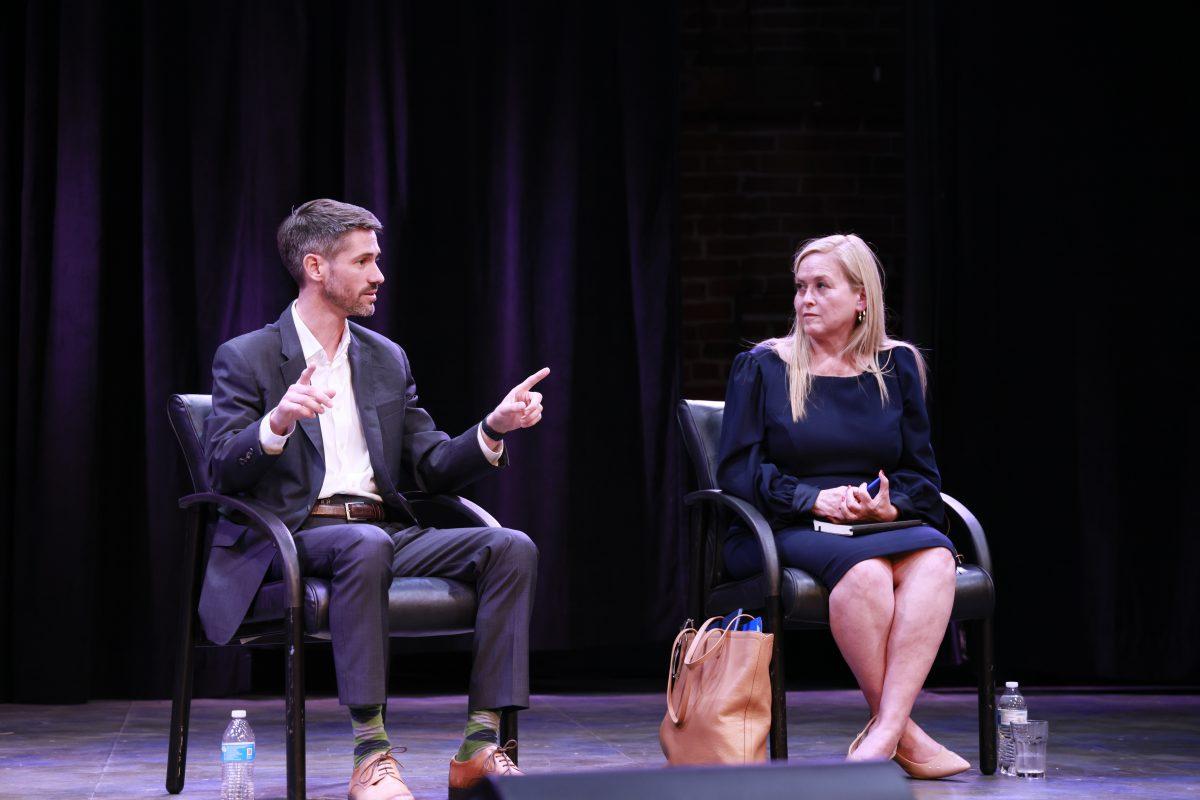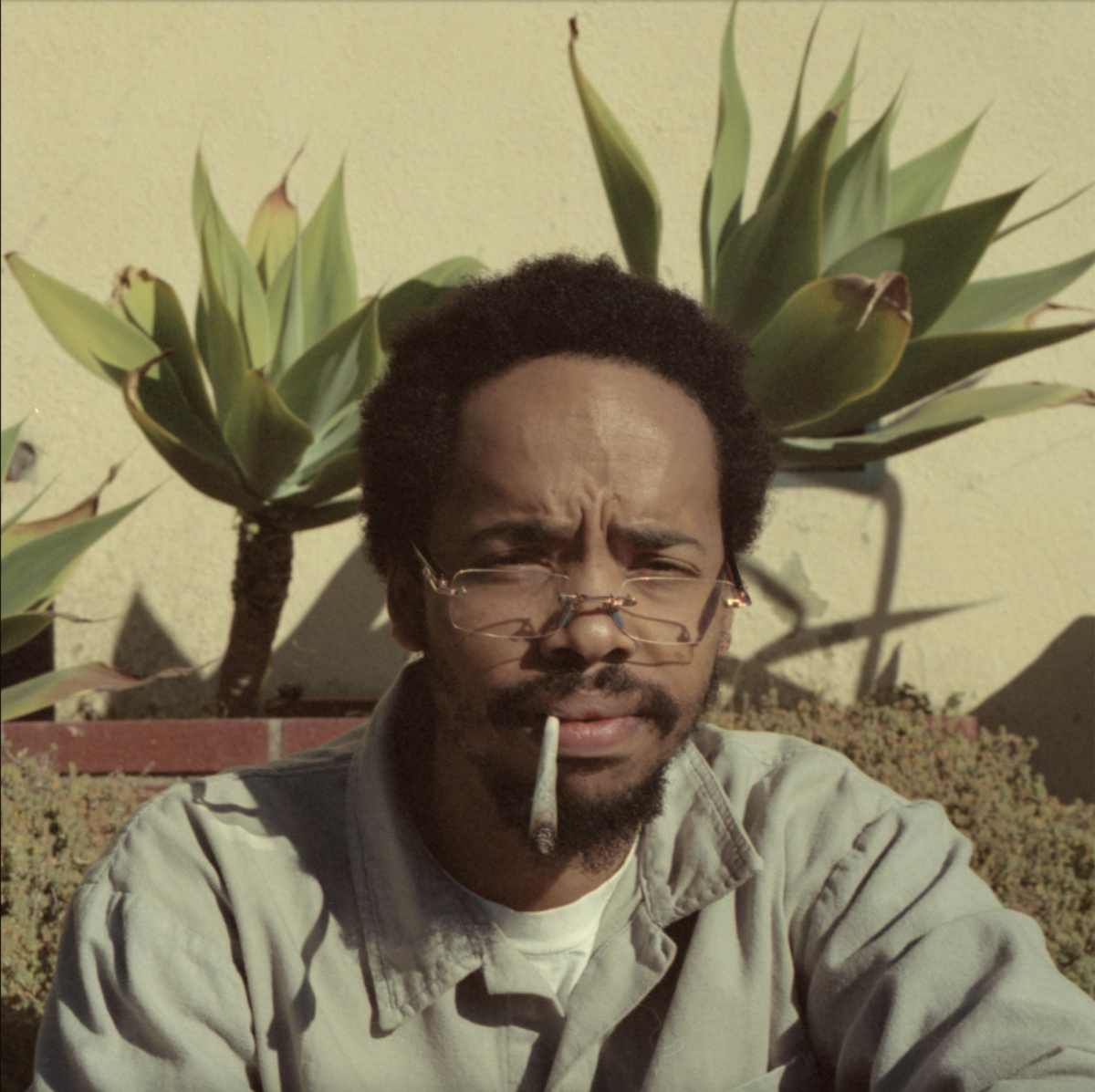San Jose Mayoral candidates Matt Mahan and Cindy Chavez sparred in a verbal war of words at a public forum Thursday moderated by San Jose Spotlight at Tabard Theatre, where more than 125 people attended in person or remotely.
The Mayoral Candidate forum came after a runoff was declared with Chavez getting 39% of the vote and Mahan getting 32%, according to a June 8 CBS article.
Attendees watched the candidates clash early in the debate as both took the opportunity to address accusations toward their respective campaigns and criticize their opponent.
“Starting in the primary as our campaign around focus, transparency, accountability, starting to get traction, my opponents campaign started talking a lot about abortion and guns and trying to twist my record on those issues,” Mahan said of Chavez’s campaign.
Chavez responded with her own critique of how her campaign has been portrayed.
“I think the most troubling thing has been to really again use Mayor Liccardo’s playbook of let’s place blame,” Chavez said. “And in the primary, I frankly didn’t talk about Mr. Mahan at all, and the reason is I was focused on my own campaign.”
Each candidate was given three minutes to respond to the moderator’s question and one minute to respond to their opponent’s answers.
The candidates talked about many hot-button issues throughout the entirety of the forum.
Here is a breakdown of what they had to say and what their policies are toward public safety and housing.
___________________________
Bojana Cvijic and Nathan Canilao contributed to this article.
Housing
Similar to a previous mayoral forum, which was held at San Jose State on April 31, Mahan and Chavez wrangled about housing.
With San Jose continuing to grapple with its housing crisis, Mahan and Chavez spoke on what they would do to solve the issues in the city.
The focal point surrounding the housing crisis was the amount of housing being built and how much was being spent.
Mahan said his concern for San Jose is the amount of money being placed into solving houselessness and the amount of land distributed to build housing on Santa Clara County land.
He also specifically criticized Chavez for being the “architect” of Measure A, a Santa Clara County measure where voters approved a $950 million affordable housing bond. The county is expected to utilize the bonds to fund 120 affordable housing developments over the next five years.
“My opponent was the architect of Measure A to push the billion dollar bomb to end homelessness and we’ve been spending at a rate for five years per prod to build a project with over $850,000 per door,” Mahan said.
The measure also funded 4,800 housing units dedicated for extremely low income households and individuals, families exiting houselessness and other underserved populations.
Chavez’s rebuttal to Mahan’s criticism of Measure A was that homelessness is not solved by a single approach and that local governments should take multiple approaches to solve the crisis.
“Solving homelessness isn’t going to happen because of a single measure or one single approach. We have to do it all,” Chavez said.
Chavez said the amount of money the county was spending on the housing crisis and what was actually being built in the process.
“We’re not spending [$850,000]. We’re spending on average $700,000 and let me just be clear, we have 44 projects that are in the pipeline, either constructed or will be completed by 2023 or in the pipeline for funding. Those 44 projects are all over the county,” Chavez said.
Chavez said the county helped put another $40 million toward housing called “quick builds” by Mahan and Mayor Sam Liccardo and referred to by Chavez as “shelter with a bathroom.”
The topic of housing became contentious after Mahan called out Chavez and Santa Clara County when he said they are not implementing “carrots and sticks” incentives to get other cities apart from San Jose to do their fair share surrounding the unhoused community.
“Carrots and sticks” refers to the combination of using reward and punishment to induce a desired behavior, according to the Collins English Dictionary.
“We have a lot of cities, Palo Alto, Cupertino, others that think nothing of basically making it really hard to be homeless and then ending up in San Jose.” Mahan said. “The county budget has nearly tripled. In the last 10 years, we have not seen a meaningful expansion of inpatient care for Addiction and Mental Illness . . . And so I haven’t seen the kind of urgency and focus on scaling up solutions that get at root causes and give us a shot at ending street homelessness in our lifetimes.”
Chavez immediately rebutted and said Mahan’s framing of the problem was disingenuous.
She said the county got involved in housing at Chavez’s urging, creating a commission to help the City of San Jose.
Chavez also said cities have responsibilities in permitting housing, investing and making housing available to communities.
“In terms of carrots, the carrots were, here are the resources. We can’t make a city do anything. You can’t make a city, do anything, no matter how many bills you try to send them. That’s just not within your [Mahan’s] purview, it is within the state’s purview,” Chavez said.
Mahan continued to retort, calling Chavez’s “solution to solve this at almost a million dollars a door” disingenuous.
“We’re not going to solve this halfway. We have a huge crisis of addiction and mental illness on our streets that the county has actually pushed against actually solving,” Mahan said.
Mahan continued by detailing specific laws like not expanding conservatorships or advocating laws like “Laura’s Law,” which mandates court-ordered assisted outpatient treatment to people with serious mental illnesses.
“We have people walking down the street and downtown, scaring our residents and you’ve [Chavez] been sitting over the county for 10 years now basically making excuses for why we can’t solve this,” Mahan said.
Chavez took exception to Mahan’s rebuttal and criticized his lack of involvement as councilmember in terms of the housing crisis.
“Part of the reason you haven’t known what’s happened is you’ve been in office for a year and a half, so while you were organizing a press conference I was organizing thousands of people getting housed,” Chavez said.
Public safety and policing
The topic of public safety and policing also surfaced several times throughout the forum and each candidate had their own interpretations of how to best address them.
The candidates found some common ground as they both agreed on the need for more police overall and heightened measures to address crime in the city.
The first question regarding policing was concerning a survey from the San Jose Police Officers Association that mentioned 200 police would retire in the near future.
Chavez said she plans to focus on hiring more police that “look like the community” in which they police.
She said the San Jose Police Department (SJPD) experienced “chronic overtime” costing the taxpayers 42-to-47 million dollars a year and as part of her plan, she intends to use that overtime pay to hire 45 new officers.
When asked how she would hire a more diverse police force, Chavez said “It’s really one of the most important things that the next mayor will do.”
She said she plans to work closely with women’s organizations, community colleges, highschools and police-officer unions to bolster the police force.
Mahan was quick to comment that he believed the problem for better police wasn’t in recruitment but in promoting offices that “reflect the diversity of our community.”
“The real gap is not actually in recruiting at that level. It’s the retaining and promoting officers to senior levels,” Mahan said.
Regarding other aspects of public safety and policing, the candidates debated about biased policing, which specifically correlated with a 2020 Independent Police Audit report released this month that showed a 25% increase in filed complaints against officers.
Mahan answered first, scrutinizing the audit and mentioning that upon asking the independent auditor himself that in their view they weren’t sure if “it was a trend yet or not because it was 2020 we had lockdowns and people were home.”
To answer the question of how to weed out bad officers from good ones, he suggested using data.
“One of the best things we can do . . . is build a better early warning system using data to identify the officers who are outliers, in terms of their use of force, or in terms of other police actions that indicate that there may be a lack of training, there may be a bias, there may be a problem,” Mahan said.
Chavez said the focus and intentionality of recruiting is the best avenue to combat bias.
She said she also believes in “keeping the bar high” and having strong “mental health scrutiny” and background checks for police officers.
What’s next
The forum, which started at six, was an hour and a half long and there are no updated polls on voters for Mahan and Chavez as of Monday.
Elections for the San Jose Mayoral runoff will be held on Nov. 8, where Mahan and Chavez will have their final face off.






































